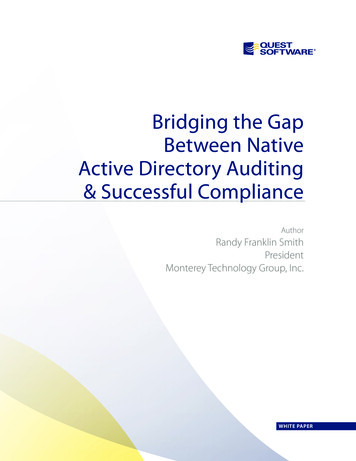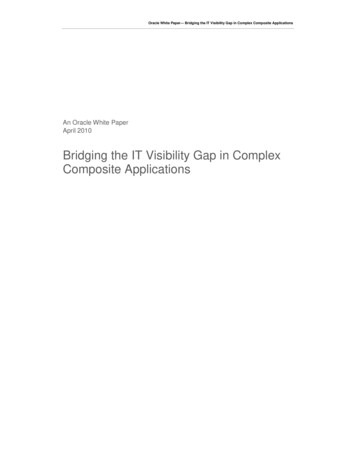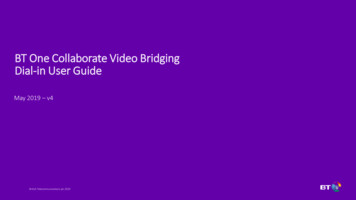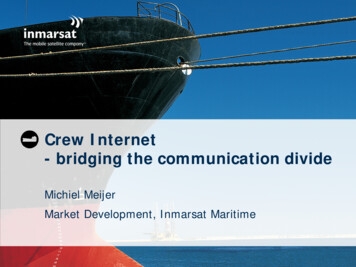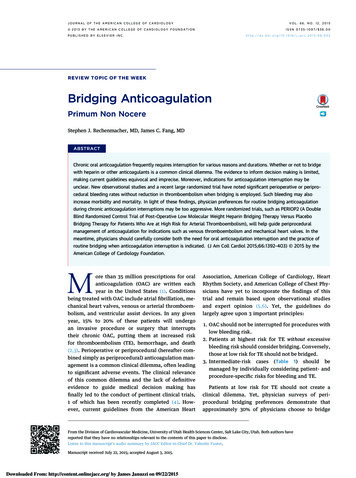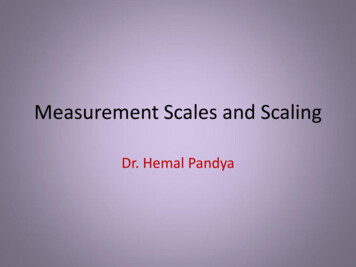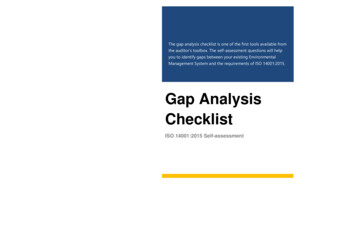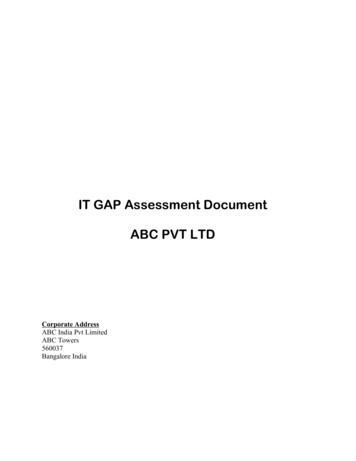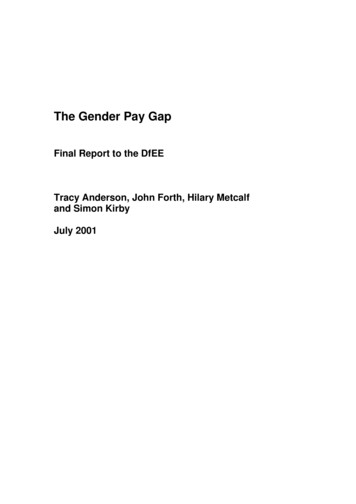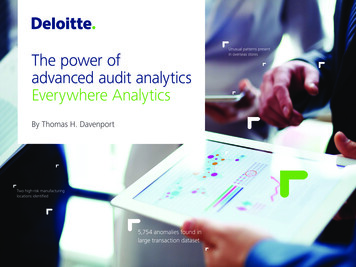
Transcription
BridgingthedatagapThe power ofin the insurance industryadvanced audit analyticsEverywhere AnalyticsBy Thomas H. DavenportTwo high-risk manufacturinglocations identified5,754 anomalies found inlarge transaction datasetUnusual patterns presentin overseas stores
The time has come for external audits toembrace the use of analytics and technology.Analytics and data have transformed otherindustries from professional sports to retailto financial services and they will transformaudits as well.
The power of advanced audit analyticsThere are many reasons why externalaudits are ripe for an analytics-driventransformation. There is more datato examine today in almost everyorganization. As more financial andoperational transactions move online,there are more variables to analyze,more outliers to identify, and moretrends and patterns to analyze.Conventional auditing approachescan’t keep up with the growth ofavailable data.Analytics also allow the possibility ofanalyzing an entire set of financialtransactions, rather than only a sample.The sampling process in audits alwayshad the possibility of leaving out keytransactions. Advanced audit analyticshave the potential to blow away muchof the hay from the haystacks, and justleave a smaller subset of needles forthe auditor to evaluate, which can havea significant impact on audit quality aswell as the business insights an auditoris able to deliver.Outside of audits, many companiesand their executives are becomingcomfortable with the ideas of dataand analytics-based decisions. Thisgeneral familiarity will make it much2The power of advanced audit analyticseasier to institute audit analytics, andat some point will undoubtedly leadto an expectation of more analyticsand advanced technology in auditprocesses. In addition, there are newtools in analytics, data management,and artificial intelligence that will makeanalytics in audits easier bothto generate and to interpret.Finally, there is little doubt thatincreasing numbers of clients areembracing analytics and relatedtechnologies to improve their internalaudits and are hence more open tohaving similar approaches be employedin external audits.
Deloitte’s advanced audit analyticsDeloitte & Touche LLP’s auditpractice is aggressively implementingthe application of analytics andtechnologies to external audits andis currently leveraging that capabilityacross its client base. Deloitteis continuing to evolve its auditmethodology, which incorporatesanalytics and artificial intelligencetechnology on client and externaldata as appropriate, while seamlesslyintegrating additional innovations.In addition to recognizing theimportance of delivering high qualityaudits, Deloitte’s leaders also realizethat there is pressure on accountingfirms to provide more meaningful andinsightful audits to clients, investors, andthe capital markets. Joe Ucuzoglu, theChairman and Chief Executive Officer ofDeloitte & Touche LLP, leading Deloitte’sU.S. audit practice, commented onthe state of the profession and audittransformation: Audit has not historically been at theforefront of innovation. However,that is changing rapidly. We need tobe evolving at the same pace as ourclients and our clients are makingsignificant investments in advancedtechnologies. They expect our auditsto keep pace.3The power of advanced audit analytics“ Our clients are makingsignificant investmentsin advanced technologies.They expect our auditsto keep pace.”Joe UcuzogluChairman and Chief Executive OfficerDeloitte & Touche LLP
Deloitte’s advanced audit analytics It is incredibly important that auditingfirms compete in a vibrant marketand find ways to differentiate thevalue of the service we provide. Wewant prospective clients to be able tochoose an auditor on the basis of keycriteria, including the quality of ourservice and, increasingly, innovation.Regulatory views about the use ofsophisticated technology and analytics inaudits also seem to be changing. MartinBaumann, the chief auditor and directorof professional standards at the PublicCompany Accounting Oversight Board,commented in a video interview for theJournal of Accountancy that: Thisis an exciting time for the profession; innovation is enabling usto demonstrate the significant valuewe provide. And it’s exciting for newprofessionals to have an opportunityto transform the way an audit isperformed. We wouldn’t want auditing standardsto be an inhibitor that mightotherwise allow technological auditachievements to move ahead.4Advanced audit analytics have alreadybeen applied by Deloitte aroundthe world and Deloitte’s clients seesubstantial value in the use ofanalytics (see the story on the nextpage).The power of advanced audit analytics“ At Deloitte we’re investingseveral hundred milliondollars in data analyticsand artificial intelligencewith some cutting-edgeapplications that we reallybelieve differentiate us andour audit approach.”Joe UcuzogluChairman and Chief Executive OfficerDeloitte & Touche LLP
H&R BlockDeloitte has deployed advancedanalytics in connection with the auditof H&R Block, a large consumer taxservices provider.Deloitte applied advanced audit analyticsto H&R Block’s revenue information.Brown notes that it was an ideal area toapply analytics because of the breadthof metrics and data that H&R Block hadavailable that could be correlated toexpected revenue outcomes.Analytics helped the H&R Block auditteam find data points that fell outsideof hypotheses. Brown sees the primarybenefit as higher audit quality, withpotential secondary benefits involvingmore meaningful insights. It’s also abenefit to subject the entire populationof transactions to some type ofexamination, rather than just a sample.Brown notes that analytics bring focusto the audit, helping to identify outliersand unexpected trends in data, andvisualize areas of risk that samplingBrown comments that while it took aninvestment of time to extract and provide methods couldn’t do. Since Brown wasthe relevant data for the audit, he believes an auditor early in his career, he canappreciate the value technology enablesit will pay off in the long run. A largein the audit process.amount of data is required for analyticsand it must be formatted, validated, andreconciled to financial statements.5The power of advanced audit analytics“ We were focused onexpanding our use of analyticsin Internal Audit. That workmade me sympathetic to theidea of analytics being appliedto our external audits. I seea lot of potential for dataanalytics in the audit space,both internally and externally,going forward.”Jeff BrownChief Accounting and Risk OfficerH&R Block
BenefitsSome of the changes to evidentiaryprocesses will involve the use ofartificial intelligence (AI) tools as well asadvanced analytics. Jon Raphael, whois Deloitte & Touche LLP’s Audit ChiefInnovation Officer, foresees a varietyof AI applications in audit. Writing inCFO Magazine, he describes tools thatEvidentiary benefits in core auditcan extract key terms and provisionsprocesses include the ability to analyzefrom contracts, visualize populationsentire sets of transactions rather thanand findings, and scan financialsamples, the ability to rapidly identifyoutliers in transaction data, and eventually statements to suggest areas of risk.even to automate some aspects of theIn fact, Deloitte auditors are alreadyidentification and assessment of materialleveraging many of these capabilitiesmisstatement risks. There is little doubtthat these capabilities will lead to a higher with various tools. Argus, Deloitte’s firstcognitive audit application, “learns”quality audit overall and will streamlinefrom every human interaction andthe audit process.leverages advanced machine learningtechniques and natural languageThere are two key benefits that resultfrom the use of advanced analyticsin audits. One relates to the coreaudit process and the other involvesancillary value for management andboard decision-making, or insights.6The power of advanced audit analyticsprocessing to automatically identifyand extract key accounting informationfrom any type of electronic document.Document review powered by cognitivetechnologies can now take a fraction ofthe time it used to. Leveraging artificialintelligence, auditors can review andassess larger samples—even up to100% of the documents.Audit Innovation of the YearJust recently, Deloitte wonInternational Accounting Bulletin’sprestigious “Audit Innovation of theYear” award for its demonstrateddedication to innovation and thedevelopment of leading-edge toolsto transform audit service delivery.
BenefitsHowever, even with exponential toolslike this, no one at Deloitte sees theelimination of human auditors in thefirm’s future. In fact, these types ofbenefits will improve auditor productivityand make the job more rewarding.As Raphael put it:Auditors can be liberated to focuson enhancing quality by evaluatingadvanced analytics, spending moretime exercising their professionaljudgment, and providing greaterinsights.Although Deloitte is pursuing advanced,cutting edge applications aggressively, asit relates to the profession some arguethat analytics-based evidentiary benefitswill be “table stakes”—eventually usedby the entire profession. More distinctiveofferings from audit analytics derived7from the audit may involve bettermanagement and board information—insights about how the business isperforming under different circumstances,a second benefit. This, of course, is theprimary purpose for which analytics havebeen applied in most organizations butadvanced analytical audits may providenew sources of data.As Lara Abrash, Deloitte & ToucheLLP’s National Managing Partner forAudit Innovation and Client ServiceDelivery, put it:Our audit professionals will be ableto discuss the business with clientexecutives in a much more meaningfulway. They’ll be able to point out wherewe are seeing trends in customerbehavior, operations, and other keyThe power of advanced audit analyticsbusiness factors. We’re building industryspecific advanced audit analytics for ouraudits that teams can apply to clientdata. Over time, we can consistentlyprovide differentiated insights andbenchmarking observations to benefitour entire audit delivery process.“ We’re buildingindustry-specific advancedaudit analytics for ouraudits that teams canapply to client data.”Lara AbrashNational Managing Partner,Audit Innovation and Client Service DeliveryDeloitte & Touche LLP
Implementing audit analyticsIt’s no surprise that audit analyticsrequire major investments inimplementation capabilities.Since audits utilize data from anorganization’s transaction systems,significant effort is required toextract and integrate client data.Data extraction and integrationcapabilities need to be employedon engagements.8Deloitte’s investments in integrated dataextraction, staging and preparationinnovations, and audit transparency andcoordination technologies are alreadydelivering benefits by making it easier forclients to prepare for and manage theaudit process.Auditors will also need to develop skillswith a new set of tools. Most auditorsare familiar with spreadsheets but manyare not as skilled with sufficiently robusttechnology for advanced audit analyticsat scale. Some of the new technologieswill include statistical packages,visual analytics systems, workflowautomation, and artificial intelligencetools. Not only numbers, but text willneed to be analyzed.The power of advanced audit analyticsLarge accounting firms, includingDeloitte, all have substantial consultingand advisory capabilities in systemdevelopment and integration. Deloitte’smultidisciplinary model has beeninstrumental in the development ofits advanced analytics technologies.Audit practices will need to furtherdevelop and refine their implementationcapabilities and technologies and Deloitteis already hiring professionals with STEM(science, technology, engineering, andmathematics) backgrounds directly intoaudit to serve this need.
New skills and university relationshipsA new kind of audit requires anew kind of auditor. It will still beessential for auditors to have a solidfoundation in the fundamentals.However, as the auditor’s rolebecomes more strategic andinsightful, audit professionals willneed a variety of enhanced skillsincluding strong capabilities andexperience with data analytics.Neither university accounting programsnor post-hire training programs havefully developed curricula to teachstatistics, data management, cognitivetechnologies, and other necessarycomponents of advanced audit analytics.Deloitte is actively working withorganizations across the profession and9with select universities to incorporatethese skills into accounting trainingcurricula as well as into their own learningprograms, culture, and capability.Firms that plan to move towardadvanced audit analytics need to hire ordevelop staff with advanced analyticalcapabilities. One approach would be toemploy a group of dedicated specialistswho only operate in the analytics fieldand have limited knowledge of theauditing process. An alternative schoolof thought believes that these skillswill need to be embedded within eachaudit professional to be successful. Theultimate solution will lie somewherebetween these two extremes.The power of advanced audit analyticsDeloitte is actively hiring non-CPAs withexpertise in data analytics to support theaudit but also plans to evolve its trainingprograms for CPAs to ensure all of ourprofessionals are equipped to deliverthe audit of the future. To acceleratethe process, Deloitte plans to bothteach auditors advanced analytical skillsand teach non-CPA professionals auditprocesses. And as an additional resource,Deloitte already has a substantialanalytics practice in its advisory andconsulting businesses and it is leveragingthese professionals as catalysts foradvanced analytical skills in audit.
New skills and university relationshipsDeloitte is actively hiring non-CPAs withexpertise in data analytics to support theaudit but also plans to evolve its trainingprograms for CPAs to ensure all of ourprofessionals are equipped to deliverthe audit of the future. To acceleratethe process, Deloitte plans to bothteach auditors advanced analytical skillsand teach non-CPA professionals auditprocesses. And as an additional resource,Deloitte already has a substantialanalytics practice in its advisory andconsulting businesses and it is leveragingthese professionals as catalysts foradvanced analytical skills in audit.10For example, Deloitte has a predictiveanalytics tool that analyzes publiclyavailable financial information to predictand assess scores for fraud, goingconcern, and restatement potential.To continuously recalibrate, refine, andimprove the models, Deloitte leveragesdata scientists from its consultingbusiness to challenge the correlationsand expand the inputs to develop aleading edge predictive model.However, as with any new processesand tools, the development of advancedaudit analytics will also necessitatea considerable degree of changemanagement activities. They will includenot only offering new initial and ongoingtraining but also revising approachesto deploying staff to engagements,developing centers of excellence, andadvising clients on changes to the auditprocess and outcomes.The power of advanced audit analytics“ No longer is the auditlimited to preliminary, final,and substantive analytics—that is yesterday. Today,forward-thinking firms areleveraging the power ofexternal data to predictoutcomes, challengeassumptions, and provideinsights. This is the potentialof the audit of the future.”Jon RaphaelAudit Chief Innovation OfficerDeloitte & Touche LLP
Analytics and the audit of the futureWe are entering a period ofwholesale transformation in auditing.The use of analytics for evidentiaryand information benefits is only thebeginning. These new technologieswill lead to dramatic changes in howaudits are performed and the valueclients receive from them.Leading academics in accounting,for example, have argued that auditsshould be a continuous rather thanannual process. Analytics, artificialintelligence, and direct linkages totransaction systems will allow auditprocesses to uncover anomalies in realtime, all the time. Material misstatementsand financial irregularities can beuncovered as they occur. This will,of course, change not only audits butalso investing and regulatory processes.11 The power of advanced audit analyticsAudits will also be substantially moreautomated in the future. There will stillbe human auditors, but they will playsubstantially different roles. Some willengage closely with advanced auditanalytics and automation systems,monitoring and tuning their performance.Some will look over the high-leveloutcomes of automated and semiautomated audit processes. Still otherswill help to develop new automatedaudit systems. And of course, auditorswill continue to evaluate key assumptionsand estimates in critical accounting andaudit matters, appropriately challengingconclusions with professional skepticismand adding value to the overall financialreporting process.
Analytics and the audit of the futureAnd looking into the future, onecan foresee a world where auditswill be much more value-added andcomparative. Will auditors be able totell their clients—based on anonymizeddata, of course—how they compare tosimilar companies on key metrics andbenchmarks? In addition to uncoveringbusiness risks, will audits also uncoverpotential business opportunities?These questions call for an informeddialogue among stakeholders todetermine how audit standards andpractices will need to evolve to continueenhancing the relevance and value ofthe audit. Ultimately, the investing publicwill be the beneficiary of higher quality,more insightful audits fueled by big dataanalysis across clients and industries.12These benefits and transformations willnot be achieved easily, but they willsurely happen. They are possible withtoday’s technology, and no feasibleinnovation remains unachieved forlong. Deloitte has made a steadfastcommitment to transforming auditservice delivery and the firm’s initiativesand investments will have a majorimpact on the audit profession, thecompanies that it audits, capital markets,and investors.The power of advanced audit analytics
For more informationContactsSheri FedokovitzPartnerDeloitte & Touche LLPsfedokovitz@deloitte.comErica NelsonPartnerDeloitte & Touche LLPericanelson@deloitte.com13Jon RaphaelPartnerAudit Chief Innovation OfficerDeloitte & Touche LLPjraphael@deloitte.comTom DavenportSenior AdvisorDeloitte Analyticstdavenport@babson.eduThe power of advanced audit analyticsAbout the authorThomas H. Davenport is the President’sDistinguished Professor of InformationTechnology and Management at BabsonCollege, a research fellow at MIT’sCenter for Digital Business, and the cofounder of the International Institutefor Analytics. He is a senior advisor toDeloitte’s analytics practice. He haswritten or edited five books on analyticsand big data, the most recent of whichis Big Data @ Work.
This publication contains general information only and is based on the experiences and research of Deloitte practitioners. Deloitte is not, by meansof this publication, rendering business, financial, investment, or other professional advice or services. This publication is not a substitute for suchprofessional advice or services, nor should it be used as a basis for any decision or action that may affect your business. Before making any decisionor taking any action that may affect your business, you should consult a qualified professional advisor. Deloitte, its affiliates, and related entities shallnot be responsible for any loss sustained by any person who relies on this publication.As used in this document, “Deloitte” means Deloitte LLP and its subsidiaries. Please see www.deloitte.com/us/about for a detaileddescription of the legal structure of Deloitte LLP and its subsidiaries. Certain
6 The power of advanced audit analytics Benefits There are two key benefits that result from the use of advanced analytics in audits. One relates to the core audit process and the other involves ancillary value for management and board decision-making, or insights. Evidentiary benefits in core audit processes include the ability to analyze
